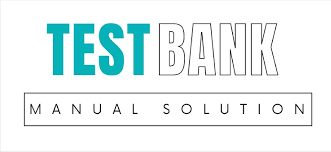The Controversy Surrounding Test Bank Solution Manuals

In the field of academics testing, the usage of test bank solutions manuals has provoked fierce debate between students, teachers as well as ethical thinkers. These manuals, usually compiled by instructors or publishers include a myriad of test questions and answers that aid instructors in preparing tests for their classes. But the existence of these manuals raises ethical questions about academic integrity, performance, and larger consequences for the education. On first look, test bank solutions manuals appear to be a harmless tool to help streamline the assessment process and guarantee the consistency of grading.
However, dig further, and a variety of ethical issues are revealed. One of the main concerns is the possibility for these guides to encourage an emphasis on rote learning over critical thinking. If students have access to an archive of questions and answers they could be focused on reciting responses instead of engaging with the content in a meaningful manner. This can undermine the learning process by prioritizing tests over real comprehension and application of the knowledge.
Additionally, the reliance on nursing test bank solutions manuals could result in a homogenization of education, in which instructors from different schools use the same set of tests and answers. The lack of diversity in assessment methods does not accommodate the individual demands and learning preferences of the students, limiting their academic development and growth. Furthermore, it undermines the importance of instructors as instructors of learning, by reducing them to being merely facilitators of pre-packaged tests.
The ethical considerations go beyond the classroom and encompass questions of fairness and equity. While some students can be able to access these manuals by legitimate avenues, some may use illegal methods like purchasing them or sharing them online. This can lead to an imbalance in academic competition, and students who have access these sources benefit from an unfair advantage over their counterparts. This means that the focus shifts from mastering the subject matter to playing the system, creating the culture of academic fraud.
The increasing number of test bank solutions manuals raises doubts regarding the reliability of assessment and the reliability of grades. If instructors heavily rely on these materials the legitimacy of tests can be questioned. Are students getting a fair assessment by their knowledge of the subject matter or are they just repeating responses that they have memorized? Additionally, the wide use for these books makes it difficult to spot instances of plagiarism or cheating and further undermines the validity of the academic assessment.
However, despite these ethical issues, the proponents of test banks solution manuals claim that they have legitimate educational purposes. They claim that these materials are appropriate to use as aids to learning, not replacements for a well-thought-out assessment design. If used correctly test bank solutions manuals can assist instructors in creating tests that are well-structured and aligned with the objectives of the course and assess students’ learning efficiently. They also argue that the manuals serve as useful study tools for students, offering them additional questions to help them strengthen their knowledge of the key concepts.
The key is in balancing the drawbacks and benefits of manuals for solving test banks. Instead of completely banning these tools, educators must use a more nuanced approach to ensures academic integrity while maximizing their potential advantages that they provide. This could involve the implementation of strict guidelines regarding the use of manuals that provide solutions to tests that emphasize crucial thinking skills and applying of knowledge to tests, as well as diversifying assessment methods to accommodate various learning methods.
Additionally, educational institutions should invest in initiatives that are aimed towards fostering a culture that promotes academic integrity and honesty. This means educating students on the ethical consequences of using test bank solution manuals and supplying students with the guidance and resources needed to be successful without using shortcuts. Furthermore, instructors should be encouraged to create assessment materials that meet the specific requirements of their students rather than relying exclusively on pre-packaged materials.
In the end, the discussion regarding manuals for test banks isn’t easy. Although these manuals provide ease of use and efficiency in testing, they present significant ethical issues that should not be overlooked. Through fostering an academic culture by encouraging critical thinking and using a variety of assessment methods instructors can negotiate this tangled landscape while ensuring that education is rewarding and fair to all pupils.





